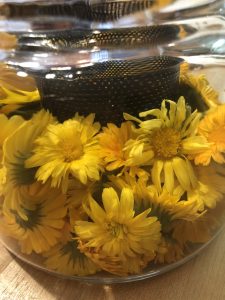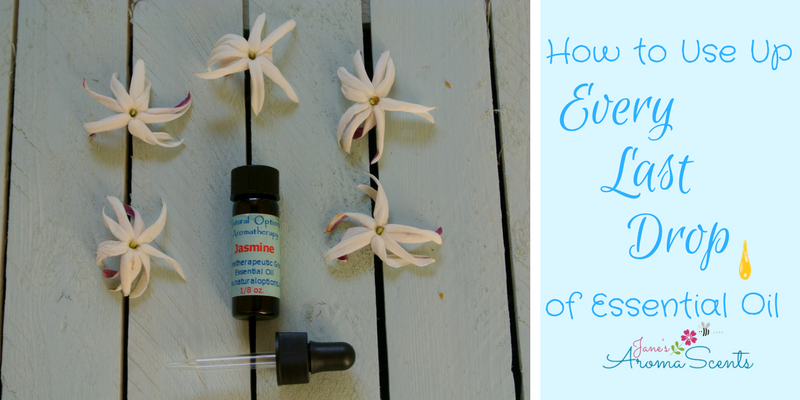How to Use Hydrosols
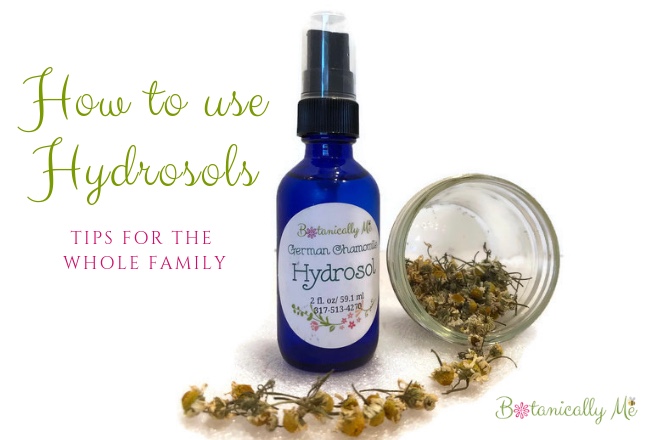 How to Use Hydrosols with Your Family
How to Use Hydrosols with Your Family
My first experience with hydrosols came when I received a pack of five of them in the mail as part of my aromatherapy studies. I opened them, smelled them, and … wondered what to do with them. Since that day a few years back, I’ve become a fan of them, well, really obsessed with them, and I use them almost every day. Their gentleness makes them perfect for use with the whole family—even the youngest ones. Let’s explore how to use hydrosols to nurture your family.
What Is a Hydrosol?
- Hydrosols are a by-product of the essential oil distillation process. You may sometimes hear them called hydrolats, floral waters, herb waters, or distillates.
- Hydrosols contain the water-soluble constituents of the aromatic plant and retain a very small amount of essential oil.
- Hydrosols are not the same thing as a few drops of essential oils added to water. That is called an aromatic spritzer.
- Hydrosols are so mild that they can be used on babies and children much more safely than essential oils can be. (For information on using essential oils with children, read my post on using EOs safely with children.)
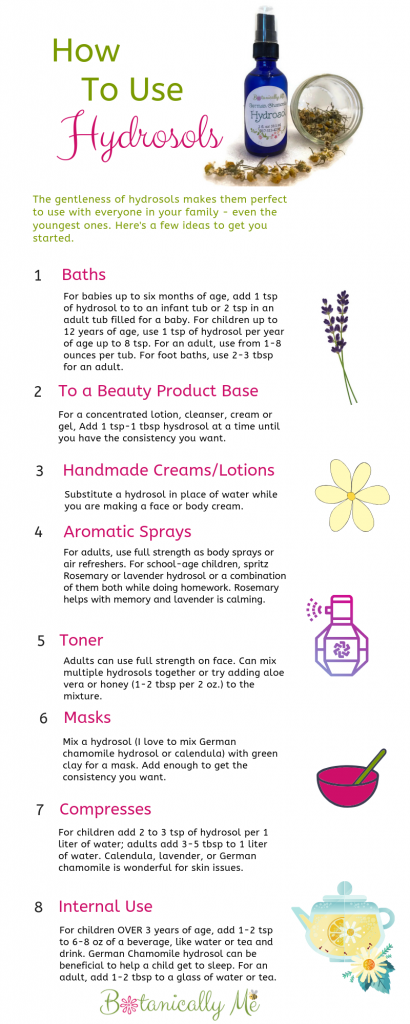
Benefits of Hydrosols
Hydrosols vs. essential oils
Hydrosols have some of the same benefits as do their essential oils, while being much gentler. They are free of the lipophilic substances that are in essential oils and are richer in water-compatible (hydrophilic) components. This means that they are:
- highly tolerable
- soothing
- generally anti-inflammatory
- antiseptic
- wonderful for sensitive skin
- mildly astringent, yet nondrying
How to Use Hydrosols
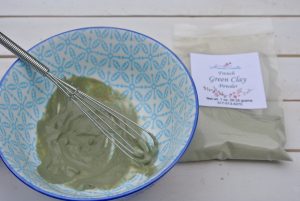 Hydrosols can be used as they are without diluting—except for use with children and when ingesting. Here are some ideas to get you started:
Hydrosols can be used as they are without diluting—except for use with children and when ingesting. Here are some ideas to get you started:
- Babies. For babies up to six months of age, add 1 tsp of hydrosol to to an infant tub or 2 tsp in an adult tub filled for a baby. For children up to 12 years of age, use 1 tsp of hydrosol per year of age up to 8 tsp. For an adult, use from 1-8 ounces per tub. For foot baths, use 2-3 tbsp for an adult.
- For concentrated lotion, cleanser, cream, and gel bases: Add 1 tsp-1 tbsp at a time until you have the consistency you want.
- For handmade creams/lotions: Substitute a hydrosol in place of water while you are making the cream.
- Aromatic sprays. For adults, use full strength as body sprays or air refreshers.
- Toner: Adults can use full strength on face. Can mix multiple hydrosols together or can add aloe vera or honey (1-2 tbsp per 2 oz.) to the mixture.
- Masks. Mix a hydrosol (I love to mix German chamomile hydrosol) with green clay for a mask. Add enough to get the consistency you want.
- Compresses. For children add 2 to 3 tsp of hydrosol per 1 liter of water; adults add 3-5 tbsp to 1 liter of water.
- Internal Use: For children OVER 3 years of age, add 1-2 tsp to 6-8 oz of a beverage, like water or tea and drink. German Chamomile hydrosol can be beneficial to help a child get to sleep. For an adult, add 1-2 tbsp to a glass of water or tea.
Be creative. Think of the potential of hydrosol uses for sunburns, wet wipes, inflamed skin, diaper rash, and so on.
How to Store Hydrosols
Fresh hydrosol that has been distilled should be pure and free of bacteria. Still, it’s best to store your hydrosols in a sterile container in the refrigerator and use within the year it is distilled.
My Take on Hydrosols
?This summer I experimented with making hydrosols and was successful in making German chamomile
hydrosol, calendula hydrosol, and lemon balm hydrosol (also called melissa hydrosol). I use the chamomile almost every day as a facial toner and alternate between using it and calendula in clay masks for facials or for bee stings. I have not yet tried it in tea or water, but have plans to mix lemon balm hydrosol in a cup of tea.
?I love the gentle, therapeutic qualities of hydrosols and their light fragrances. The three that I made all retain a lighter aroma of the plant than the essential oil does. If you have children, hydrosols are the perfect soothing herbal treat to use with them, and you don’t have the concerns that you do as when using essential oils.
?Hydrosols are definitely hard to find in retail stores, but you can order them online. Eden Botanicals, Stillpoint Aromatics, and Mountain Rose Herbs are just three companies that carry them.
?Actually, as an aromatherapist, I can’t recommend hydrosols highly enough. I hope this post has given you some ideas on how to try them, and I bet that soon they’’ll be part of your go-to remedies to care for and pamper yourself and your family!
Let me know if you have any questions in the comment section, or share what your favorite hydrosol is and how you use it.
Botanically me,
Jane
Resources
I used the resources listed below as I was writing this post. (I am an affiliate for both the New York Institute and Amazon).
The New York Institute of Aromatic Studies is where I received my Level 1 aromatherapy training and certification from. I continue to study with them. You can see all the classes they offer at the hyperlink. They offer both online and in-person classes.
The following two books both have a section on hydrosols.
